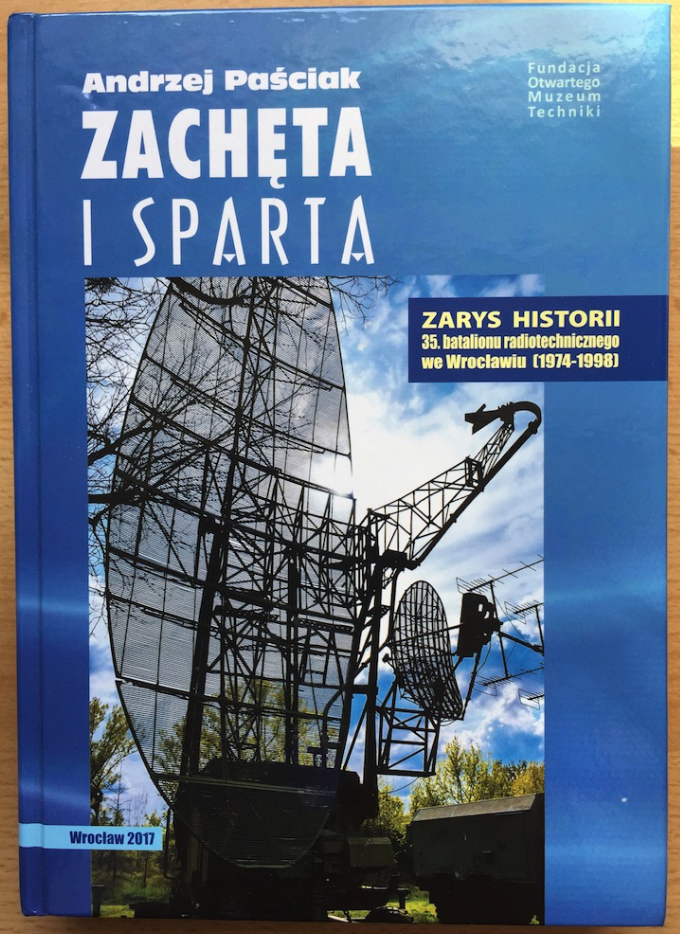Kraków 2018-04-09
The new book:
"Zachęta i Sparta”. (Wrocław 2017) Andrzej Paściak.
For years, the history of military aviation has aroused keen interest among the next generations of Polish youth. Good literature, which is abundant on the Polish market, plays an invaluable role in igniting this enthusiasm. And that is why, with undisguised joy, we present another publication on aviation.
At the beginning of 2018, the book by Mr. Colonel Andrzej Paściak, entitled: –
„ZACHĘTA i SPARTA”
This time, the author introduces us to the radiolocation service less known to Polish society. Less known, because for many decades the most hidden and secret. Service deciding on the recognition of potential threats that may come from the air. Without the radio-technical troops, it would not be possible to properly and safely perform the tasks by the aviation regiment and the safe flights of commercial aircraft. In addition, the radar troops used the most advanced technology, in which the Polish Radio Industry was also quite successful.
First of all, the book presents the history of the 35th radio engineering battalion in Wrocław in the years 1974 – 1998 (JW 1642), but not only. It contains a lot of interesting and widely unknown information about the service of radio-technical troops, their organization, places of stationing and the equipment used. While preparing for writing, the author obtained hundreds of archival information, conducted dozens of interviews and collected dozens of individual memories. And these are the memories of not only officers, but also soldiers of the drafting service. The author spent long hours talking to participants in past events and studied many volumes of old documents. The book is full of footnotes, which means that all information is supported by source material. Despite the large number of specialist terms used in the text, the author managed to use a style that makes the book extremely pleasant to read, just like popular science. The work also contains a lot of unknown and very interesting photos.
The book is not a dry account and a soulless description of events, equipment or structures. She is alive with the international situation of the time, relations with allies and opponents, and above all with the daily difficulties in serving. Even such as the lack of the right to the banner, which had to be borrowed from the 11th Fighter Aviation Regiment during the battalion’s ceremonies. The work is extremely objective. The author does not avoid difficult topics, such as, for example, the relationship between the various years of service, or the arbitrary abandonment of the individual. Also, few people in the society know that the duty at the radar stations was a combat service and the soldiers were sworn in before the duty began. This book is a mine of knowledge about radio engineering troops and all interested parties will find something that will be of special interest to them.
An introductory word to the book was written by a specialist in radio engineering, Mr. Colonel, retired, retired engineer Stanisław Słotwiński, who in the years 2004-2006 was the Chief of the Radio-Technical Forces, at first the Air Force Agency, and after changing the name of the Air Force.
The reader should be explained the title of the publication "ZACHĘTA i SPARTA". JW 1642 was initially codenamed ZACHĘTA. After changing the code names in 1979, the battalion was called SPARTA in the Polish Army.
Andrzej Paściak, lieutenant colonel, doctor of science, b. in 1956 in Wrocław, a graduate of Secondary School No. 12, graduated in history at the University of Wrocław. In the years 1980 – 2008 he performed professional military service in various units of the National Air Defense Forces and the Polish Air Force, incl. in 35. BRT and at the Command Post, in the headquarters and command of the 3rd Air Defense Corps. Military observer in UN missions in Angola (MONUA, 1998 – 1999), Kuwait and Iraq (UNIKOM, 2000 – 2001) and in the Democratic Republic of Congo (MONUC, 2003 – 2004). For several years he was a freelance but licensed inspector of the "Treaty on Conventional Armed Forces in Europe" (CFE) and the "Treaty on Open Skies", taking part in inspections, both in Poland and abroad.
After completing his professional military service, in 2010 at the Faculty of History of the University of Wrocław, he defended his doctoral dissertation prepared under the supervision of prof. dr. hab. Jerzy Maroń on the history of Polish military aviation in Wrocław. Co-author of the book “3. Corps of Air Defense 1957 – 2007 "(Wrocław 2007), author of the monographs" Military Aviation in Wrocław 1911 – 2010 "(Wrocław 2014)," Romb – Wrocław pilot team 1958 – 1963 "(Wrocław 2015) and" Zachęta "and Sparta". An outline of the history of the 35th radio engineering battalion in Wrocław 1974-1998 ”(Wrocław 2017). The last three books were published by the FOMT publishing house. He is also the author of several articles on the history of aviation, especially after 1945 in Wrocław and Lower Silesia.
The author’s cooperation with the Foundation dates back to 2003, when, while serving in the 3rd Air Defense Corps in Wrocław, he cooperated with the Open Museum of Technology Foundation in organizing the International Conference "Aviation. Centenary of Change ”.
Written by Karol Placha Hetman

